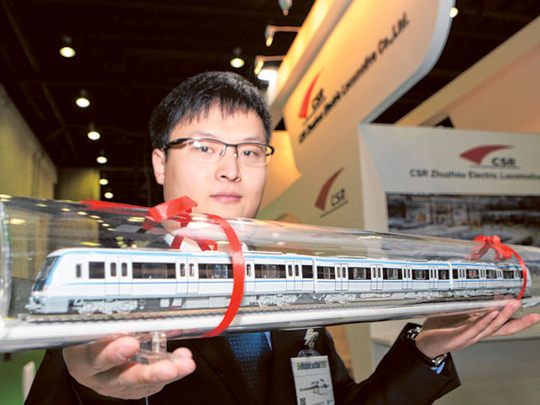
Dubai: Plans to include railway networks in transport systems in the Gulf countries come in a response to the region’s economic and population growth. It is worth noting its economic advantages.
By and large, trade inside and between GCC countries has not played a big part in driving GCC economies. The trade volume makes up only three per cent of the GCC gross domestic product (GDP), according to a recent report by Gulf Petrochemicals and Chemicals Association (GPCA) in cooperation with A.T Kearney.
This highlights the opportunities of rail transport systems in the GCC. It can lead to economic development, highlighted the report.
Etihad Rail, which is developing a railway network project worth Dh40 billion, recently announced that its project will bring an increase of Dh3.5 billion to the country’s GDP by 2030. It is also expected to bring more than Dh2 billion in savings to the UAE, and an economic return rate of 15.5 per cent.
Similar projects are underway in Qatar and Saudi Arabia.
Additionally, “rail transport can increase trade between GCC countries,” said Dan Starta, managing director for Middle East and Africa at A.T. Kearney.
Freight volume transported by rail is expected to grow at five per cent annually until 2020, stated the report.
Rail can also facilitate an increased economic cooperation between GCC countries, it continued.
. Freight trains can stop at several stations across the network to off load freight, which facilitates more trade between the GCC countries. It is also a cheaper alternative than trucks, says Strata.
“What I think rail will do is add options and flexibility. Trucks will still be there, but there is the option to use rail,” he continued.
The economic benefit extends to passengers as well, he said.
The low cost of a trip on a train or metro can cut down overall transportation costs for passengers. People will eventually move to areas close to train stations, he said.
Already, the trend can be seen in Dubai, wherein residents are starting to move closer to metro stations, he indicated.
Another economic benefit of railway networks is the decreased dependency it can bring on foreign labourers. There will be less need for foreign drivers as the train will be equipped with systems to control its movement, according to the report.
Overall, railway networks improve the competitiveness and the investment environment in the GCC, which can develop export trade, it highlighted.
—Sarah Algethami is a trainee at Gulf News.












